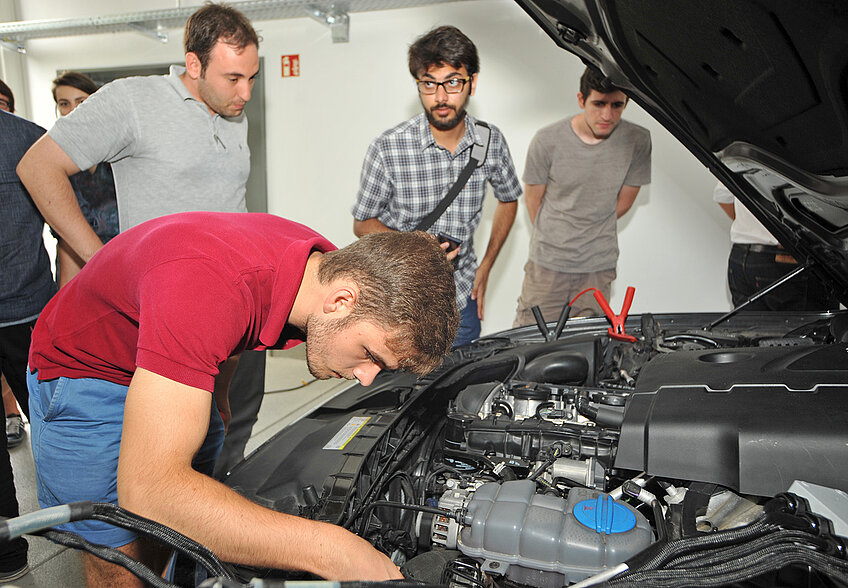
Another significant initiative of the future profile region: the Automotive Summer School offered by HsKA, attracting many international students each year (photo: John Christ/HsKA)
The region of Karlsruhe is a high-profile location for research and industry in the field of mobility. As part of the “Profilregion Mobilitätssysteme Karlsruhe“ alliance, regional research partners can now pool their expertise in order to develop efficient, intelligent and integrated mobility solutions. The aim is to ensure attractive living and working conditions balanced with an ever growing flow of people and goods. The 8 million euro project is funded by the State of Baden-Württemberg.
- Shaping the future of sustainable, intelligent and safe mobility -
"The intelligent design of a sustainable mobility system is an urgent challenge that needs to be addressed by society as a whole. To promote innovation in this area, we need a close network of stakeholders from science, economy and society", says Theresia Bauer, Minister for Science, Research and the Arts, Baden-Württemberg. “In this context, universities and research partners act as driving force and future labs for cutting-edge research by supporting projects like the profile region as a trigger of innovation. At the same time, they promote the region in terms of sustainability and innovation power.”
"Future mobility solutions should originate from Baden-Württemberg“, says Peter Hofelich, State Secretary at the Ministry of Finance and Energy of the State of Baden-Württemberg. “Profile Region Mobility Systems Karlsruhe – positioned right at the start of the value chain – can lay the foundations.”
This project underlines Karlsruhe’s role as mobility research hub, enhancing the region’s impact, visibility and innovation power. The total budget of the profile region amounts to roughly €8m. Baden-Württemberg’s Ministries of Science, Research and the Arts and of Finance and Economics each will contribute an amount of approximately €2.1m during the two-year pilot phase. The founding partners of the Profile Region Mobility Systems Karlsruhe include Karlsruhe Institute of Technology (KIT), Karlsruhe-based Fraunhofer Institutes for Chemical Technology (ICT), for Optronics, Systems Technologies and Image Exploitation (ISOSB), Systems and Innovation Research (ISI) and Mechanics of Materials (IWM), Karlsruhe University of Applied Sciences and the Research Center Information Technology (FZI). The network is intended to grow by continuously integrating new partnering organizations in order to enable synergies and transfer of knowledge between all parties involved in joint research projects.
Mobility is crucial to solving today’s social challenges such as growing urbanization, demographic change and sustainability and meeting the needs of future generations. Future mobility must meet high demands, while offering a high level of flexibility, safety and eco-friendliness.
In order to develop future-oriented solutions for ground-based mobility in a changing society, Profile Region Mobility Systems Karlsruhe brings together experts from technical, socio-technical and social fields of research. The objective is to provide efficient, intelligent and integrated mobility systems designed to reconcile attractive living and working conditions and the ever growing flow of people and goods and thus strengthen Karlsruhe’s position as a center for research. The profile region is supposed to pool resources and expertise in order to develop forward looking mobility solutions in Karlsruhe. Moreover, it creates the partner structures required to consolidate Baden-Württemberg’s position as a mobility center in the long term.
Since the start of the project, the partners have initiated seven joint projects: This includes an analysis of changing mobility and transport requirements through an aging society or urbanization. The project team also develops mobility concepts and technical solutions addressing these specific challenges. Two other projects deal with new challenges for urban infrastructure and urban traffic flow and focus on networked mobility which allows future vehicles to communicate with each other, for instance via new ICT platforms. Another project addresses the trend towards increasingly automated and autonomous mobility. To this end, a driverless car with corresponding IT services is currently being designed and tested. Research also covers electric, hybrid-electric and conventional combustion engine-based drives designed to enhance efficiency and reduce carbon emission. Two projects related to this field of research are managed by the Institute for Energy-Efficient Mobility of Karlsruhe University of Applied Sciences. A team of researchers headed by Professor Dr. Peter Neugebauer will develop a novel hybrid and thus efficient vehicle drive specifically designed for urban and regional areas. Another team headed by Professor Dr. Maurice Kettner will focus on the development of CO2-neutral and low-emission combustion engines. Finally, there is a project that deals with integrated lightweight construction based on an intelligent combination of materials, taking an electric compressor for combustion engines as an example.
“Joining this innovative alliance allows us to be actively involved in the further development of the entire region in an important pioneering field”, says Professor Dr. Markus Stöckner, Vice-President of Karlsruhe University of Applied Sciences. “It also helps us to sharpen our university profile with regard to research and teaching in the field of present and future mobility and to offer our students interesting topics for their seminar papers and degree theses. Moreover, we can provide another platform for doctorate procedures in cooperation with KIT, covering these innovative fields of research.”
2024 © HAWtech ContactPrivacy PolicyLegal NoteLogin